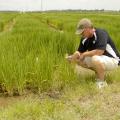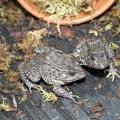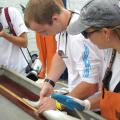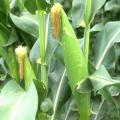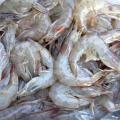News From 2013
MISSISSIPPI STATE – Every summer, nature enthusiasts come across baby animals they think are orphans, but most of the time, these young animals have not been abandoned.
Fawn births in Mississippi peak in July and August but many are born from May through October. Wild hogs can have one to three litters per year, depending on circumstances, so it is not unusual for people to encounter young wild animals.
STONEVILLE – Like most Mississippi row-crops struggling to overcome last spring’s challenges, rice will be at the mercy of late-season weather to produce average yields.
Tim Walker, rice specialist with the Mississippi State University Extension Service, said rains kept farmers from timely plantings. After that, cool spring temperatures slowed growth, putting much of the rice crop about three weeks behind schedule.
Once the crop was established, a new problem emerged.
“The biggest challenge has been herbicide drift from other crops,” he said.
MISSISSIPPI STATE – Mississippi State University has joined the ranks of conservationists trying to increase the population of one of the most critically endangered species living in North America.
Mississippi gopher frogs are native to south Mississippi, and for a time, the only known colony living and breeding in the wild was living in one Harrison County pond. They have since been found living near three other ponds in the DeSoto National Forest, bringing the total known wild population to an estimated 100-200 gopher frogs.
STONEVILLE – Mississippi State University scientists looking to help catfish producers keep costs low and quality high have found catfish can thrive for the first six weeks after hatching by feeding on naturally occurring zooplankton.
Several aquaculture researchers at MSU’s Thad Cochran National Warmwater Aquaculture Center compared the growth and survival of two groups of recently hatched catfish, called fry. Both groups were raised in ponds, but for six weeks, one group ate commercial feed daily while the other group did not.
MISSISSIPPI STATE – A 4-H program created in the South is training the nation’s next generation of responsible landowners, land managers and wildlife professionals.
The Wildlife Habitat Education Program began in Tennessee in 1978 as a way to teach 4-H’ers the fundamentals of wildlife science and how to manage habitats to benefit different animal species. In addition to general information about wildlife and conservation, participants participate in contests to test their individual knowledge and their ability to work as a team to create a wildlife management plan.
I’ve been getting a lot of questions from homeowners who want to add some color to landscapes in the middle of this hot and humid summer. My answer brings bad news.
It is really tough to add color at this time of year to in-ground planting beds. To be truly successful, plants for summer color need to be planted in the spring to ensure they establish a good root system before the heat of summer sets in.
RAYMOND – Former colleagues, friends and family members used the words loyal, genuine and humble to describe Frank T. “Butch” Withers Jr. during a naming ceremony in Raymond for the center he helped create.
Mississippi State University’s central Mississippi hub for research and Extension was renamed on July 10 for Withers, who served as head of the center from 1996 until his retirement in 2006.
JACKSON -- Playground antics, such as teasing, hitting, or name-calling, may seem just a harmless rite of passage, but when playing turns into bullying, it can cause serious, long-term effects for everyone involved.
Bullying is a dangerous form of youth violence that involves repeated, aggressive behavior with a real or perceived imbalance of power between the bully and the victim. Bullies create this imbalance of power by using their popularity, physical strength or embarrassing information to manipulate or harm the victim.
MISSISSIPPI STATE – Mississippi schools are leading the national effort to reduce excessive sugar intake from beverages that can do students more harm than good, and parents can follow their example at home.
Becke Bounds, assistant director of child nutrition with the Mississippi Department of Education, said Mississippi schools eliminated all full-calorie, sugared carbonated soft drinks during the school day in 2007. Steps have also been taken to make all school food healthier.
MISSISSIPPI STATE – Kids are not the only people feeling stressed about going back to school.
As families count down the days of summer, the idea of returning to schedules packed with work, school and extracurricular activities can cause a lot of tension.
Cassandra Kirkland, family life specialist with the Mississippi State University Extension Service, said getting organized now can help ease families into the required routines.
JACKSON – As the carefree days of summer vacation quickly come to a close, parents should take steps to keep their kids safe as they return to the routines of school.
“Parents should keep in mind there are precautions to take no matter how their child gets to and from school,” said Beth Bell, Tallahatchie County child and family development agent with Mississippi State University’s Extension Service.
JACKSON – After school, most kids raid the kitchen before they hit the books. If fruit is not one of their favorites, a few simple recipes and a little planning can help kids make better snacking decisions.
“Kids probably won’t choose to eat an orange if they have to do the work of peeling it before they eat it,” said Dawn Vosbein, registered dietitian and family and consumer science agent with Mississippi State University’s Extension Service in Pearl River County. “If there is cut up fruit already in the fridge, all they have to do is grab it.”
MISSISSIPPI STATE – If Mississippi’s corn growers thought planting season was a wild ride, they better fasten their seatbelts for harvest time.
Erick Larson, corn specialist with the Mississippi State University Extension Service, said wet fields and cooler temperatures last spring resulted in less-than-desirable corn stands, and these conditions often delayed or prevented growers from planting their intended corn acreage.
MISSISSIPPI STATE – Mississippi State University’s beef cattle research unit in Pearl River County is hosting a summer field day Aug. 13 to display results of ongoing research projects.
The White Sand Unit of the Mississippi Agricultural and Forestry Experiment Station is hosting the half-day event specifically designed for cattle and forage producers. The event begins at 9 a.m. and concludes with a provided lunch. The MSU Extension Service is also helping make this event possible.
STARKVILLE -- A Mississippi State University forestry professor was recently honored by the Society of American Foresters.
The professional forestry organization named Donald Grebner a fellow for his contributions to the society and the forestry profession.
Grebner is a professor in the university’s Forest and Wildlife Research Center. His areas of research include bio-energy, carbon sequestration, forest protection and international forestry.
MISSISSIPPI STATE – Some of Mississippi’s top young people will experience the business world through a four-day state tour known as the 2013 4-H Cooperative Business Leadership Conference.
The conference involves the state’s 4-H Leadership Team members and this year’s 4-H Congress first-place, senior-level competition winners. In a July 16-19 bus tour that begins and ends at Mississippi State University, participants will stop along the way at business cooperatives in Mayhew, Meridian, Jackson, Greenville, Scott and Greenwood.
MISSISSIPPI STATE -- A veteran Mississippi State University faculty member is the new associate dean in the College of Forest Resources.
Ian Munn, a forest resource economist and professor, will lead the university’s natural resources program. MSU is the only university in the state that offers a bachelor’s degree in forestry and a bachelor’s degree and wildlife, fisheries and aquaculture. As associate dean, Munn will coordinate all aspects of these undergraduate programs, including curriculum, student advising and scholarships.
Mississippi landscapers often see favorite trees fall victim to lightning, strong winds and other elements, especially during tropical storm season, leaving the owners to make hard decisions on the trees’ future health.
Typical damage includes wounds, split branches, exposed roots, various degrees of leaning trunks, and broken and torn limbs. In many cases, a damaged tree must be removed and replaced.
BILOXI – More than 250 boats launched on June 11 to open the shrimp season in Mississippi’s coastal waters.
A cold, wet spring delayed the season’s start, which opened June 1 last year.
“The things farmers hate -- drought and heat -- are great for shrimp production,” said Dave Burrage, commercial and recreational fisheries specialist with the Mississippi State University Extension Service. “The brown shrimp don’t grow as fast under the conditions we had this spring, but once it gets hot, they can go up a whole count size in a week.”
Pages
News Types
- Crop Report (424)
- Feature Story (5889)
- Feature Photo (53)
- Extension Outdoors (318)
- Southern Gardening (1471)
- Extension Inbox (95)
Archive
- 2025 (66)
- 2024 (186)
- 2023 (182)
- 2022 (183)
- 2021 (176)
- 2020 (211)
- 2019 (222)
- 2018 (276)
- 2017 (336)
- 2016 (381)
- 2015 (456)
- 2014 (495)
- 2013 (487)
- 2012 (491)
- 2011 (354)
- 2010 (320)
- 2009 (313)
- 2008 (272)
- 2007 (263)
- 2006 (252)
- 2005 (278)
- 2004 (270)
- 2003 (279)
- 2002 (227)
- 2001 (238)
- 2000 (241)
- 1999 (231)
- 1998 (231)
- 1997 (239)
- 1996 (58)
- 1995 (36)


